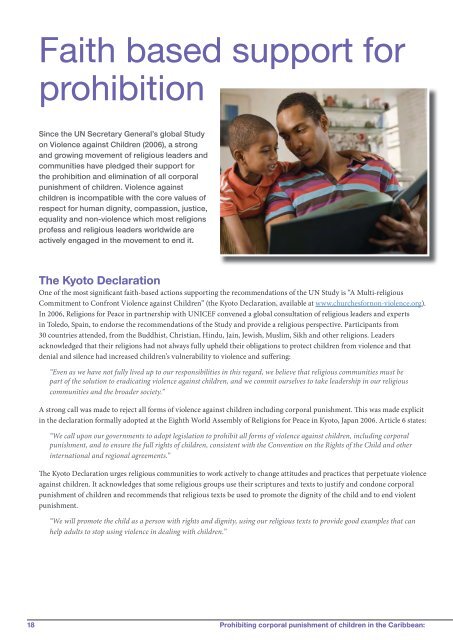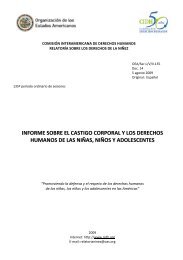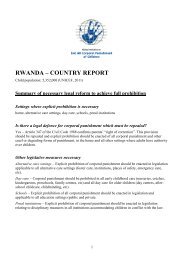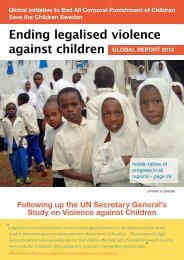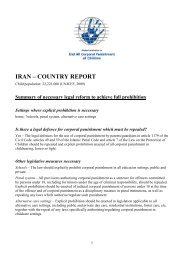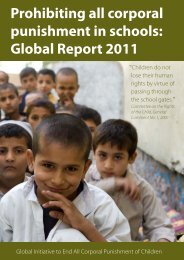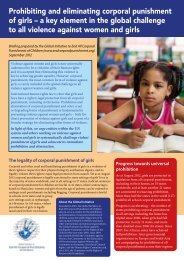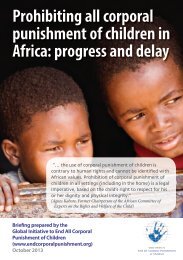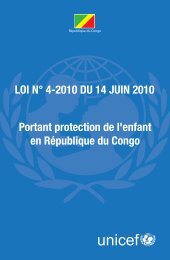Prohibiting corporal punishment of children in the Caribbean ...
Prohibiting corporal punishment of children in the Caribbean ...
Prohibiting corporal punishment of children in the Caribbean ...
You also want an ePaper? Increase the reach of your titles
YUMPU automatically turns print PDFs into web optimized ePapers that Google loves.
Faith based support forprohibitionS<strong>in</strong>ce <strong>the</strong> UN Secretary General’s global Studyon Violence aga<strong>in</strong>st Children (2006), a strongand grow<strong>in</strong>g movement <strong>of</strong> religious leaders andcommunities have pledged <strong>the</strong>ir support for<strong>the</strong> prohibition and elim<strong>in</strong>ation <strong>of</strong> all <strong>corporal</strong><strong>punishment</strong> <strong>of</strong> <strong>children</strong>. Violence aga<strong>in</strong>st<strong>children</strong> is <strong>in</strong>compatible with <strong>the</strong> core values <strong>of</strong>respect for human dignity, compassion, justice,equality and non-violence which most religionspr<strong>of</strong>ess and religious leaders worldwide areactively engaged <strong>in</strong> <strong>the</strong> movement to end it.The Kyoto DeclarationOne <strong>of</strong> <strong>the</strong> most significant faith-based actions support<strong>in</strong>g <strong>the</strong> recommendations <strong>of</strong> <strong>the</strong> UN Study is “A Multi-religiousCommitment to Confront Violence aga<strong>in</strong>st Children” (<strong>the</strong> Kyoto Declaration, available at www.churchesfornon-violence.org).In 2006, Religions for Peace <strong>in</strong> partnership with UNICEF convened a global consultation <strong>of</strong> religious leaders and experts<strong>in</strong> Toledo, Spa<strong>in</strong>, to endorse <strong>the</strong> recommendations <strong>of</strong> <strong>the</strong> Study and provide a religious perspective. Participants from30 countries attended, from <strong>the</strong> Buddhist, Christian, H<strong>in</strong>du, Ja<strong>in</strong>, Jewish, Muslim, Sikh and o<strong>the</strong>r religions. Leadersacknowledged that <strong>the</strong>ir religions had not always fully upheld <strong>the</strong>ir obligations to protect <strong>children</strong> from violence and thatdenial and silence had <strong>in</strong>creased <strong>children</strong>’s vulnerability to violence and suffer<strong>in</strong>g:“Even as we have not fully lived up to our responsibilities <strong>in</strong> this regard, we believe that religious communities must bepart <strong>of</strong> <strong>the</strong> solution to eradicat<strong>in</strong>g violence aga<strong>in</strong>st <strong>children</strong>, and we commit ourselves to take leadership <strong>in</strong> our religiouscommunities and <strong>the</strong> broader society.”A strong call was made to reject all forms <strong>of</strong> violence aga<strong>in</strong>st <strong>children</strong> <strong>in</strong>clud<strong>in</strong>g <strong>corporal</strong> <strong>punishment</strong>. This was made explicit<strong>in</strong> <strong>the</strong> declaration formally adopted at <strong>the</strong> Eighth World Assembly <strong>of</strong> Religions for Peace <strong>in</strong> Kyoto, Japan 2006. Article 6 states:“We call upon our governments to adopt legislation to prohibit all forms <strong>of</strong> violence aga<strong>in</strong>st <strong>children</strong>, <strong>in</strong>clud<strong>in</strong>g <strong>corporal</strong><strong>punishment</strong>, and to ensure <strong>the</strong> full rights <strong>of</strong> <strong>children</strong>, consistent with <strong>the</strong> Convention on <strong>the</strong> Rights <strong>of</strong> <strong>the</strong> Child and o<strong>the</strong>r<strong>in</strong>ternational and regional agreements.”The Kyoto Declaration urges religious communities to work actively to change attitudes and practices that perpetuate violenceaga<strong>in</strong>st <strong>children</strong>. It acknowledges that some religious groups use <strong>the</strong>ir scriptures and texts to justify and condone <strong>corporal</strong><strong>punishment</strong> <strong>of</strong> <strong>children</strong> and recommends that religious texts be used to promote <strong>the</strong> dignity <strong>of</strong> <strong>the</strong> child and to end violent<strong>punishment</strong>.“We will promote <strong>the</strong> child as a person with rights and dignity, us<strong>in</strong>g our religious texts to provide good examples that canhelp adults to stop us<strong>in</strong>g violence <strong>in</strong> deal<strong>in</strong>g with <strong>children</strong>.”18 <strong>Prohibit<strong>in</strong>g</strong> <strong>corporal</strong> <strong>punishment</strong> <strong>of</strong> <strong>children</strong> <strong>in</strong> <strong>the</strong> <strong>Caribbean</strong>:


